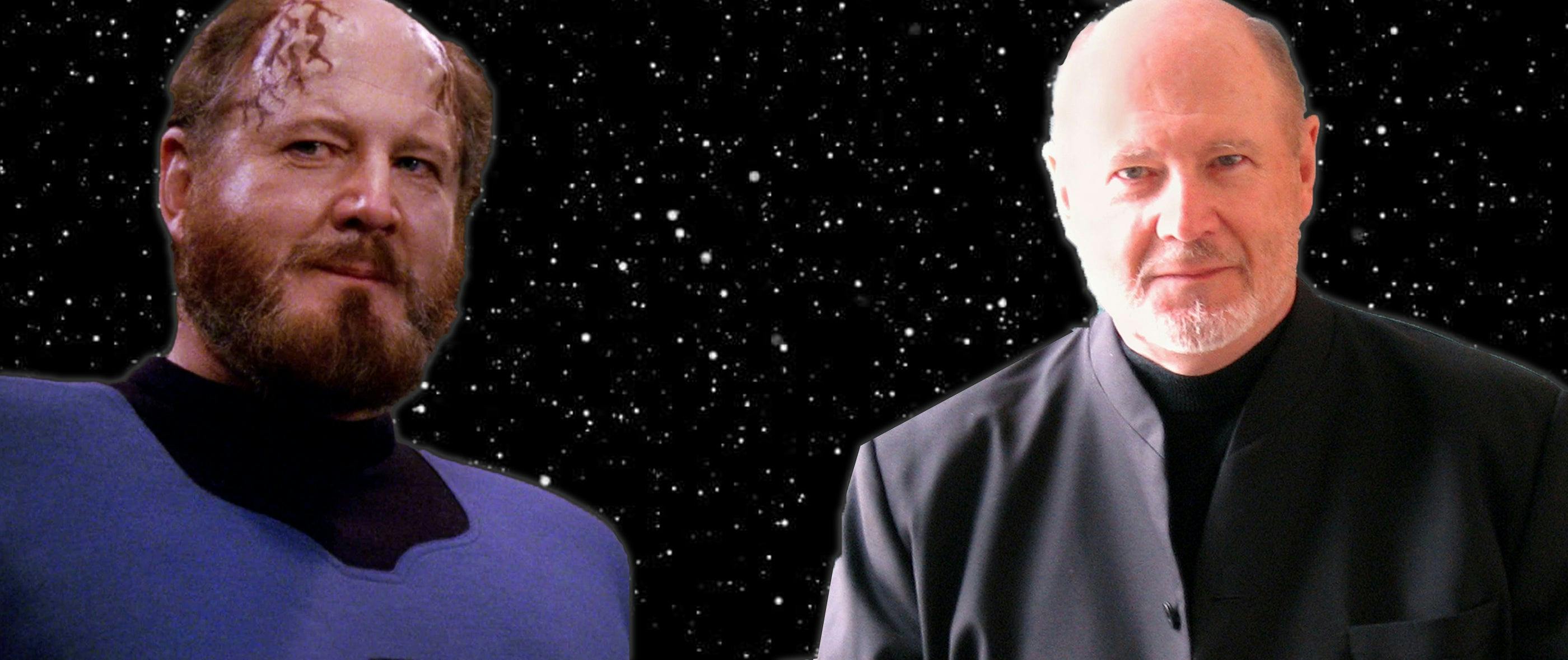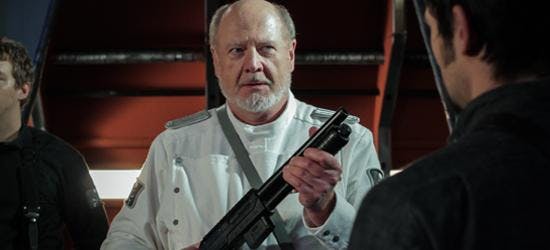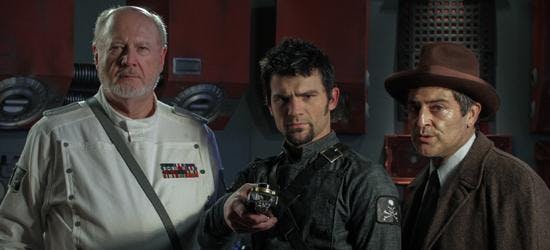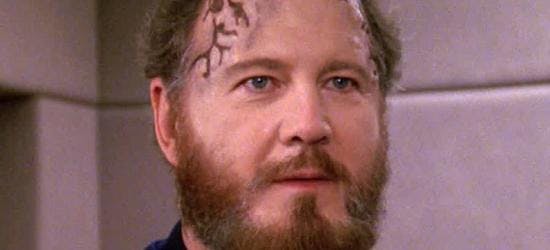Published Apr 11, 2017
Catching Up with TNG Guest Star David Ogden Stiers
Catching Up with TNG Guest Star David Ogden Stiers

David Ogden Stiers is the very definition of range. The actor has portrayed King Lear on stage… three times. He earned two Emmy Award nominations for his portrayal of the pompous, wry, all-too-human Maj. Charles Emerson Winchester III on M*A*S*H. And, in the Star Trek: The Next Generation episode “Half a Life,” he touched viewers as Dr. Timicin, a scientist who must undergo the Resolution, a ritual suicide, in order to save the people on his planet, Kaelon II. However, his plans were thrown for a loop – at least for a while --when he met and fell for Lwaxana Troi. The episode is well-regarded for its powerful story, rare focus on two guest stars, unusually serious Lwaxana arc and the touching performances by Stiers and Majel Barrett-Roddenberry.
StarTrek.com has long wanted to chat with Stiers, and we finally landed an interview, thanks to the release today of the mostly retired actor’s latest project, Neil Stryker and the Tyrant of Time, an outlandish sci-fi/comedy/adventure that also features Walter Koenig. The plot is impossible to describe succinctly, but it’s set in the future, centers on a master secret agent (Rob Taylor) determined to rescue his son from a mad scientist baddie (Rob Taylor… again), and features goblins and robots, as well as fights and explosions a-plenty. Stiers makes an extended cameo as a character named the Admiral. The film is available now on all major digital and on-demand platforms, including iTunes, Amazon, Dish and Direct TV.
Here’s what Stiers had to say about Neil Stryker, “Half a Life” and more:
When people recognize you out in public, what are the films and shows, or maybe the characters they're most excited to discuss or pepper you with questions about?
I am seldom recognized anymore -- and I really like that. Actually, this will be my time to live like a person, rather than some collectible figure or worse, a nostalgia act. But, when I am recognized, it's for the green show, for M*A*S*H. Occasionally, it's for Better Off Dead, which I understand is a cult movie. And it tells me a lot about a person if they remember a Larry Gelbart project entitled Mastergate. That was done, as I recall, by HBO. It was such a collection of famous actors, I can't tell you. They all came out of the woodwork to do this Larry Gelbart project, and it is savagely funny, cynical, enlightening, enraging, a great piece, and when people know that or include it in the body of work, I really like hearing that. It also helps a lot if anybody's seen me on stage. I've done Lear three times and I got approached a few years ago in L.A. doing Much Ado About Nothing with the LA Shakespeare Festival. Someone said, "I saw you in Much Ado and I loved it. My friends and I had a wonderful discussion about aging," which actually brings us rather to Star Trek, doesn't it?
Yes, absolutely. But before we go there, you only act sporadically these days. What does it take to get you say yes to a film or an episode of a show?
Really, usually it's because I know people involved in it so well that I want to work with them again. So, that's just a way of catching up with people. When you're playing a scene together, you really are together if it's a good acting friend. Or, I’ll be interested if it’s something I've never done before, something that is just so refreshingly different from the norm, whatever the hell the norm is. The nature of the piece attracts me more than certainly money.
Something I’m doing now… I'm narrating, actually embodying… the voice of James Beard, one of the first real foodie TV cooking show hosts. He was in the beginning and Julia Child was chapter two. It’s a PBS documentary on James Beard, and I'm reading from his diaries and letters, and trying to come as close as I can to his voice.

You’ve also got this crazy sci-fi comedy, Neil Stryker and the Tyrant of Time. The project took almost 10 years to make. How long were you involved?
It's several years, actually. (Writer-producer-co-star) Nic Costa just chatted me up in a hotel lobby and I was intrigued. I wanted to read the script, so he delivered one, two or three pages of Admiral scenes, one of which was lost in editing. I worked for a couple of days, and when I finally walked into the studio, to the former bakery, I went, "What the hell have I gotten myself into?" because it was all so by the seat of the pants. The trailer on YouTube is phenomenally modern, with beautifully crafted shots that are breathtaking. It's not the project I signed on for, but I'll take it. They came here. Nic and (director-producer-star) Rob came here a couple of weekends ago, and I shot the Blu-ray interview spot. They came to Newport (Oregon). They did me the favor to come to where I live.
Now, how much fun did you have playing the Admiral for those few days? Good laughs?
I had more fun than you're supposed to have and a lot of frustration because they're stealing it. They're stealing the movie. I mean that in a very particular way. They both made films before, but nothing of this scale. All the computer-generated stuff, I think, was done in New Zealand and the final editing was done there as well. But, as you say, Nic and Rob have been working on this for 10 years, and they're still friends. They still find ways to make each other laugh. That's really uncommon.

Walter Koenig is in the film as well. We know you didn’t shoot any scenes together, but any chance you overlapped on set?
No, sadly.
What are you up to when you're not working?
Oh, I'm retired. I'm a resident conductor of the Newport Symphony Orchestra here, and happy as a clam. I bought a beautiful house overlooking a lot of water. I spend my days reading and doing a lot of online educating. I hope I'm educating myself with facts.

Let's turn back the clock to 1991. How did you land your role on The Next Generation? Did they call you?
Yes, it was an offer. It wasn't an audition. You never know the circumstances. In the case of a Matlock episode a lot of years ago, I got a role because somebody dropped out two days before filming was to occur. I think a better offer or something tectonic in their life had shifted, and I had two days to learn how to play a blind person, to figure out what I was going to do. Star Trek wasn't that tight by any means.
You understand that things become, not mechanical, but once a show falls into its rhythm it pretty much runs itself. People are cordial, but they don't take time to bond because in a few days a whole new bunch of actors is going to walk in to have to adapt to. The Star Trek cast were thoroughly in the rhythm, but it doesn't speak to quality. It speaks to how people define their jobs and do them so well that they don't get caught doing a job. You see this on the screen and it's convincing, utterly convincing.
The only thing that bothered me walking into the set for the first time ... Well, there were two incidents that I actually recall. There were those beautiful hallways, those tubular, gentle-curve hallways. I was not prepared for the fact that you do not talk when one of the air doors is opening because what's actually recording is bluh-bluh-bluh-bluh-bluh-bluh-bluh. Somebody's on the other side of it. They're rolling it open as smoothly as they can, but it makes a lot of noise, so you don't talk, or you dub later.
The other thing was that on a particularly rainy day, my second day working… Television has a rough schedule. A lot of pages get shot in a single day. I went to my little, tiny dressing room thing parked out alongside the building and discovered there was a leak in this round-topped dressing room arrangement that had found my clothing. I had soggy, rain-soaked trousers and a soggy shirt. I was already stressed and not particularly in the mood when I heard, "Mr. Stiers, we'd like to see you on the set, please. We're ready to rehearse 13A." I shouted back... I won't tell you what I said exactly, but, "I'll be there when I'm damned good and ready." There was this awful pause from outside, and then the same voice said, plaintively, "I have your umbrella." Heaven forbid we should get the costume wet, right?
How familiar at the time were you with the Trek franchise in general and what did you know about TNG?
I watched it. I was a dedicated watcher of Next Generation when I could, when you're not getting home at an impossible hour -- and there was no TiVo then. I’d also loved the first generation of Star Trek. That was the real hook and the honor of working with Majel and going to the Roddenberry home, to sit down and talk about my role and his relationship with Majel’s character, and to say hello to Gene.
Timicin, for a guest star role, had a full arc. He had to undergo, or not, his Resolution in order to save his planet's sun and have more time with Lwaxana.
That's a nice chunk of drama for a guest star to chew on, you are right. They really let it focus on the two of us, which was very unusual. I just watched a clip of it this morning. I had forgotten how beautifully written the arguments are. The whole moral dilemma was beautifully presented. I'm not jumping up and down, but I really like the idea that I live in a state with dignity legislation and physician assisted suicide, should it ever come to that. That seems to me to be an intelligent and mature middle ground. You don't use it if you don't want to, but it's there if you are in need, for whatever reason, of a legitimate reason for ending your life.
How did you enjoy meeting the Roddenberrys and working with Majel?
For a person I didn't really know and for someone whom I just met on the set, and meeting her husband in their home, that was the hardest kiss I've ever had from a woman. She planted it and it was pressing into upper and lower bone. It was a fiercely wonderful, unabashed, unalloyed kiss. It was eye-opening and eye-closing. And I spoke just a little bit with Gene (who by then had suffered a stroke). He was sitting with a blanket over his legs and had just come out of a nap and obviously wanting to get back to it, but it was an honor to meet him.
Timicin’s makeup was very striking. What do you recall of that process involving getting those vein-like applications put on?
Oh, it was two and a half hours in the morning to squirt that stuff on. They'd already had latex applications made, but it still took an awful long time, and 45 minutes to remove so my skin wouldn't go with the stuff. It was OK, but Michael Westmore and I both agreed that it would be much simpler to make a headpiece that just slipped on and would slip off, reusable, so the seams could be repainted in the morning rather than the entire makeup being reapplied. But it gave me time to learn the lines.
You mentioned seeing clips this morning, but did you ever see the finished episode. And, if so, what did you make of it?
Yes, I did, and interestingly, perhaps, I watched it with my parents, who were then alive, and we had a long talk afterwards about life, death, aging, eventualities. "Are you in a position to be able to take care of us if we need that?" "Yes." "What do you think about the episode?" and I said, "You know, I've been dealing with this since I shot it. I'm more interested in hearing what you happen to think." They were very forthcoming, but very conservative about it. They thought it was a matter for extremis rather than a careful planning, were such a thing to ever come about. This is well before enlightened Oregon passed the Death with Dignity Act, so it was a fascinating light to turn on the backstory, the human, the most intimate human backstory. I think we left it unresolved, but a good deal more willing to talk about such things in the future, which was really remarkable.
Nerd trivia coming up, but there’s a blink-and-you-miss-it tribute to you and to M*A*S*H in the episode. When Timicin takes his test, the camera holds on a display that reads, "Composite sensors analysis 4077." Is that news to you or are you fully aware of that?
Both (laughs). I didn’t notice it myself. They had to point it out. They couldn't let it go. And there were a couple of others. The group’s cleverness and craftsmanship were both also in evidence in that episode.
About 20 years later you were directed on Leverage by Jonathan Frakes. Did you have a chance to reminisce or did TNG not even come up?
I'm pretty sure those days are a blur to him and he's happy to have moved on. We chatted about it cordially, but we both had work to do. On a set we don't dawdle, so we would talk over lunch or little moments of re-lighting or a camera reset. So, we had a few moments of reminiscence, but mostly it was catching up with how he’d evolved. "How many more are you directing of this show? What are you branching out into?" He's a very bright man.
Star Trek just celebrated its 50th anniversary. We realize you only did the one episode of TNG, but what does it mean to you to be a part of the long legacy of Star Trek, especially with an episode as good, as memorable and as important as “Half a Life”?
Oh, wow. There are little highlights along my career, having shot a movie with Katharine Hepburn, doing Star Trek: Next Generation, certainly M*A*S*H, working with Zero Mostel on Broadway. To see Beauty and the Beast registered as one of the top 100 films, that’s an honor. There are little flags planted in the career map that are... Everything is privilege. We're lucky to be actors and to make the livings we do playing, just playing.

